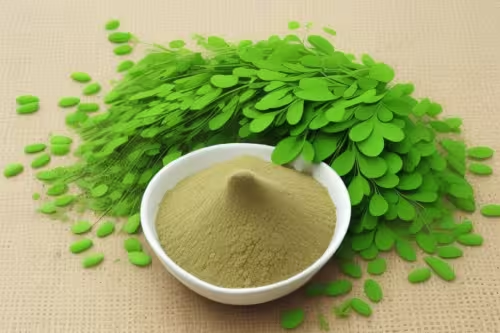

The Miracle of Moringa: 12 Science-Backed Health Benefits
Moringa oleifera, also known as the drumstick tree, horseradish tree, or ben oil tree, is a plant native to North India that has been used in traditional medicine for thousands of years. It is a versatile plant, with almost all parts of it being edible and used in various forms of traditional medicine.

Moringa is rich in healthy antioxidants and bioactive plant compounds, and has been linked to several health benefits. In this article, we will explore 12 science-backed health benefits of the Moringa plant.
-
Highly Nutritious Moringa leaves are packed with vitamins and minerals. One cup of fresh, chopped leaves contains 2 grams of protein, 19% of the recommended daily allowance (RDA) of vitamin B6, 12% of the RDA of vitamin C, 11% of the RDA of iron, 11% of the RDA of riboflavin (B2), 9% of the RDA of vitamin A (from beta-carotene), and 8% of the RDA of magnesium. Moringa leaves are also a good source of calcium, potassium, and manganese.
-
Rich in Antioxidants Moringa leaves are rich in various antioxidants, including vitamin C, beta-carotene, quercetin, and chlorogenic acid. These antioxidants protect the body from free radicals, which can cause oxidative stress and are associated with chronic diseases like heart disease and type 2 diabetes.
-
May Lower Blood Sugar Levels High blood sugar can lead to serious health problems, including heart disease. Several studies have shown that Moringa may help lower blood sugar levels. One study in 30 women found that taking 1.5 teaspoons (7 grams) of Moringa leaf powder every day for three months significantly increased blood antioxidant levels. Another small study in six people with diabetes found that adding 50 grams of Moringa leaves to a meal reduced the rise in blood sugar by 21%.
-
May Reduce Inflammation Inflammation is the body’s natural response to infection or injury. Sustained inflammation is linked to many chronic health problems, including heart disease and cancer. Moringa leaves, pods, and seeds have been shown to have anti-inflammatory properties in animal and test-tube studies. The isothiocyanates in Moringa leaves, pods, and seeds are believed to be the main anti-inflammatory compounds.
-
May Lower Cholesterol High cholesterol has been linked to an increased risk of heart disease. Moringa oleifera may have cholesterol-lowering effects, similar to flaxseeds, oats, and almonds. A study in rats found that Moringa leaf extract reduced cholesterol levels by 50% and triglyceride levels by 33%.
-
May Protect Against Arsenic Toxicity Arsenic contamination of food and water is a problem in many parts of the world. Long-term exposure to high levels of arsenic may lead to health problems over time. Several studies in mice and rats have shown that the leaves and seeds of Moringa oleifera may protect against some of the effects of arsenic toxicity.
-
May Protect the Liver Moringa has been shown to protect the liver from damage and improve liver function. A study in rats found that Moringa leaf extract protected the liver from damage caused by anti-tubercular drugs.
-
May Improve Digestive Health Moringa may help improve digestive health by reducing inflammation in the gut and improving gut bacteria. A study in rats found that Moringa leaf extract reduced inflammation in the gut and improved gut bacteria.
-
May Improve Brain Health Moringa contains several compounds that may help improve brain health, including antioxidants and compounds that can reduce inflammation. A study in mice found that Moringa leaf extract improved memory and cognitive function.
-
May Have Anticancer Properties Some studies have shown that Moringa extracts may have anticancer properties and may help reduce the side effects of chemotherapy. A study in mice found that Moringa leaf extract reduced the size of breast cancer tumors by 50%.
-
May Improve Bone Health Moringa is rich in calcium and phosphorus, which are essential for bone health. A study in rats found that Moringa leaf extract improved bone density and strength.
-
May Improve Skin Health Moringa is rich in vitamins A, C, and E, which are essential for skin health. A study in rats found that Moringa leaf extract improved skin health and reduced the signs of aging.

Moringa oleifera is a plant with many health benefits. It is rich in vitamins, minerals, and antioxidants, and may help lower blood sugar levels, reduce inflammation, lower cholesterol, protect against arsenic toxicity, protect the liver, improve digestive health, improve brain health, have anticancer properties, improve bone health, and improve skin health. However, more research is needed to confirm these benefits and determine the optimal dosage. Moringa leaves, pods, and seeds can be consumed in various forms, including fresh, dried, powdered, or as an extract. It is important to consult a healthcare professional before taking Moringa supplements, especially if you have a medical condition or are taking medication.



